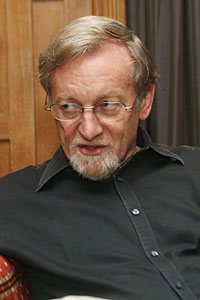October marked 50 years since the Indonesian military launched one of the twentieth century's worst mass murders. Yet the anniversary passed almost unnoticed. The massacre of some 500,000 members or sympathisers of the Indonesian Communist Party (PKI) during 1965-1966 is the least talked-about genocide of the last century.
Lifting the veil on the bloodbath is long overdue, but those with a past to hide seem bound to resist this. Organisers of Bali's renowned Ubud Writers and Readers Festival have just had a foretaste of what may be a new round of active censorship, with local officials threatening to cancel the entire festival if proposed panel discussions of the massacres went ahead.
The killings started in October 1965 in the aftermath of an abortive coup allegedly planned by the PKI. The military reacted by portraying the party and its supporters as an atheist force of evil which had to be annihilated. The resulting carnage was deliberate, systematic, and spanned the country, with the most horrific and intense violence in Central and East Java, Bali and northern Sumatra.
This year also marks the centenary of the Armenian genocide, about which successive Turkish governments have maintained an indefensible denial. But at least the fate of the more than one million Turkish Armenians killed outright or death-marched into the Syrian desert in 1915 for their wartime "disloyalty" remains the subject of immense international scrutiny, research and advocacy.
By contrast, the Indonesian genocide remains the only killing of this scale that has not been the subject of close global attention. Nor, apart from a largely ignored National Human Rights Commission report in 2012, has there been any significant domestic truth-finding, let alone a reconciliation process or reparations. The subject is avoided in history books, evaded by diplomats, and forms no part of domestic political discourse.
The story begins with an abortive coup on the night of Sept 30, 1965, when junior military officers, claiming to be protecting President Sukarno from a right-wing clique, captured and executed the army commander and five other high-ranking generals. The following evening, Major General -- later President -- Suharto led a successful counter-coup. Suharto's action marked the beginning of the end of the Sukarno era, and the birth of his "New Order": the pro-Western, business-friendly regime that would govern Indonesia for the next three decades.
Suharto and his associates immediately blamed the PKI as the masterminds of the "September 30 Movement", and spread gruesome stories about the torture and mutilation of the executed officers. Army-led and militia-implemented mass murders soon followed.
Controversy continues to this day as to who was actually responsible for the initial coup. Candidates include Suharto himself (he certainly had some foreknowledge of events), acting with or without United States support, and even the British Foreign Office. The balance of opinion among international scholars is that a small group around PKI leader Aidit was involved, but not in a way that even remotely implicated the entire party, or that could even begin to justify the bloody nationwide purge which followed.
With Suharto's accession to power, Indonesia shifted almost overnight from being a strong voice for neutrality and anti-imperialism, actively courting the attention of the Soviet Union and Communist China, to becoming a more compliant partner with the US, which now saw Indonesia as a major stabilising force in a volatile region. As a result, there was no appetite among the US and its allies -- including my own country, and the Australian government of which I was a member -- to look closely, then or since, at how Suharto's New Order consolidated its power. Within Indonesia itself, even with the Suharto era long gone, anti-communist sentiment remains strong, survivors remain cowed, and demands for justice and accountability remain few.
Things may, however, be starting to change, especially following the release three years ago of Joshua Oppenheimer's extraordinary documentary film, The Act of Killing. Oppenheimer records, in meticulous and horrifying detail, a group of former death-squad leaders re-enacting the murders they committed -- not, at least initially, in any spirit of confession or remorse, but rather to portray themselves as the heroes of a necessary process of national purification.
Some viewers are not persuaded of the film's accuracy, or are troubled by the occasionally surreal character of the film-within-a-film structure adopted by the director. But to me its essential truth resonates profoundly: The Act of Killing is the most haunting and emotionally lacerating documentary I have ever seen. I hope that Oppenheimer's film and its recently released follow-up, The Look of Silence, achieve the audience and impact they deserve -- and not just at the world's film festivals, but in Indonesia itself.
The Indonesian genocide -- and it deserves to be so described, even if its impulse was ideological rather than ethnic, religious or national -- is an alarming case study in the politics of mass murder. It shows what leaders can get away with when they demonise opponents, achieving conceivably defensible ends by morally atrocious means. That is just one reason Indonesia's campaign of killing demands much more of the world's attention, and censure, than it has so far received. ©2015 Project Syndicate
Gareth Evans, Australia's foreign minister from 1988-1996 and President of the International Crisis Group from 2000-2009, is the author of 'The Responsibility to Protect: Ending Mass Atrocity Crimes Once and for All'.
